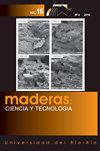油热和致密化同时处理对加拿大杨木物理性能的影响
IF 1.5
4区 农林科学
Q3 MATERIALS SCIENCE, PAPER & WOOD
引用次数: 1
摘要
采用橄榄油对加拿大杨(Populus × canadensis)木材样品(湿度为9.5%)进行195°C同时压缩致密化15%或30%的处理,并将结果与未经致密化的油热处理样品和对照样品进行比较。处理后样品的密度分别增加了18%、43%和1.5%,并且在随后的6个月里(大约65% RH, 20°C)储存在实验室室内几乎没有变化。这是由于由额外含水量引起的轻微重量增加被回弹效应引起的体积增加所抵消。当被置于不同相对湿度的环境中时,处理过的样品与对照样品同时稳定下来,尽管处理过的样品的吸湿率明显低于对照样品。油热致密处理样品的吸湿收缩率约为对照样品的一半。由于回弹,初始致密性部分丢失:在相对湿度为65% RH的第一次回弹中大约丢失3%,在相对湿度为85% RH的第二次回弹中额外丢失4%。一旦达到后一种相对湿度,就没有观察到致密化的新损失。在处理中使用的油的老化导致密度最大的样品中密度的轻微损失。本文章由计算机程序翻译,如有差异,请以英文原文为准。
Simultaneous treatment with oil heat and densification on physical properties of Populus × Canadensis wood
Samples of wood from Populus × canadensis (9,5 % moisture) were treated with olive oil at 195 °C simultaneously with 15 % or 30 % compression densification, and the results were compared with samples subjected to oil heat treatment without densification, and control samples. The density of the treated samples increased by 18 %, 43 % and 1,5 % respectively, and barely changed over the six subsequent months stored inside the laboratory room (at approximately 65 % RH, 20 °C). This was due to the fact that the slight weight increment caused by the additional moisture content was offset by the increase in volume from the springback effect. When subjected to atmospheres with different relative humidities, the treated samples stabilised at the same time as the control samples, although the treated samples had a significantly lower moisture absorption than the control samples. It was also observed that the hygroscopic shrinkage in oil heat densification treatment samples was approximately half those of the control samples. The initial densification was partially lost as a result of springback: approximately 3 % in the first springback at a relative humidity of 65 % RH, and an additional 4 % in the second springback to a relative humidity of 85 % RH. Once this latter relative humidity had been attained, no new losses in densification were observed. The ageing of the oil used in the treatment caused a slight loss of densification in the densest samples.
求助全文
通过发布文献求助,成功后即可免费获取论文全文。
去求助
来源期刊

Maderas-ciencia Y Tecnologia
工程技术-材料科学:纸与木材
CiteScore
2.60
自引率
13.30%
发文量
33
审稿时长
>12 weeks
期刊介绍:
Maderas-Cienc Tecnol publishes inedits and original research articles in Spanish and English. The contributions for their publication should be unpublished and the journal is reserved all the rights of reproduction of the content of the same ones. All the articles are subjected to evaluation to the Publishing Committee or external consultants. At least two reviewers under double blind system. Previous acceptance of the Publishing Committee, summaries of thesis of Magíster and Doctorate are also published, technical opinions, revision of books and reports of congresses, related with the Science and the Technology of the Wood. The journal have not articles processing and submission charges.
 求助内容:
求助内容: 应助结果提醒方式:
应助结果提醒方式:


